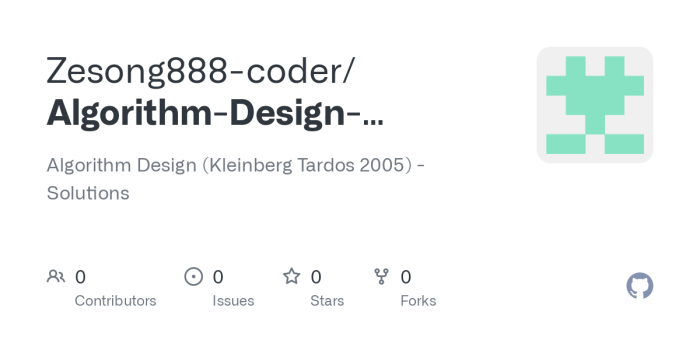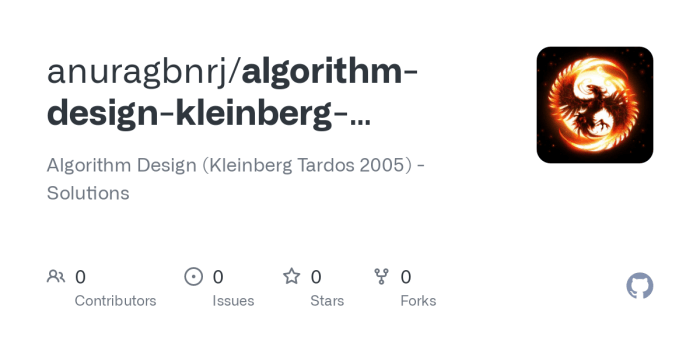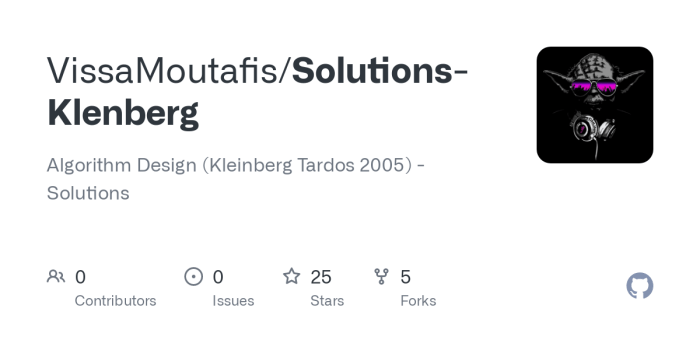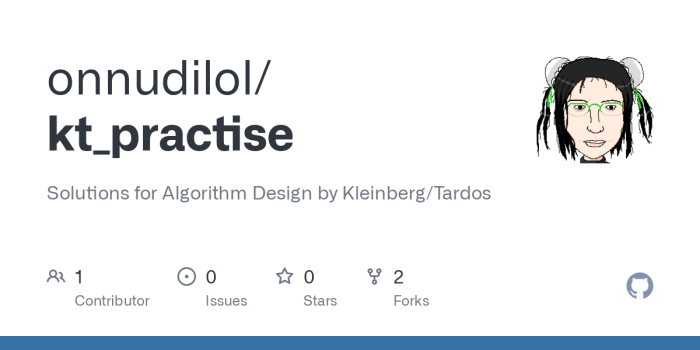Algorithm Design Kleinberg Tardos Solutions, a seminal work in the field of algorithm design, provides a comprehensive and authoritative guide to the fundamental principles and techniques of algorithm design. Authored by renowned computer scientists Jon Kleinberg and Eva Tardos, this book has become a cornerstone of algorithm design education and research.
Through a systematic and accessible approach, Algorithm Design Kleinberg Tardos Solutions covers a wide range of topics, from basic concepts to advanced algorithmic techniques. It explores the fundamental principles of algorithm design, such as greedy algorithms, dynamic programming, and divide-and-conquer algorithms, providing a solid foundation for understanding the design and analysis of efficient algorithms.
Introduction

Algorithm design is a fundamental aspect of computer science, focusing on the systematic development of efficient and effective algorithms to solve computational problems. Jon Kleinberg and Eva Tardos, renowned researchers in the field, have authored the influential book “Algorithm Design,” which serves as a comprehensive guide to this essential topic.
Their book aims to equip readers with a deep understanding of algorithmic techniques, enabling them to analyze and design algorithms for various real-world scenarios.
Overview of the Book: Algorithm Design Kleinberg Tardos Solutions

Kleinberg and Tardos’s book is structured into three parts, each covering a distinct aspect of algorithm design.
Part I provides an introduction to the fundamental concepts and techniques, including divide-and-conquer, dynamic programming, and greedy algorithms.
Part II delves into more advanced topics, such as network flow, linear programming, and approximation algorithms.
Part III focuses on case studies, showcasing how the techniques presented in the book are applied to solve real-world problems.
Algorithmic Techniques
- Divide-and-Conquer:Breaking a problem into smaller subproblems, solving them independently, and combining the solutions.
- Dynamic Programming:Storing intermediate solutions to avoid redundant computations.
- Greedy Algorithms:Making locally optimal choices at each step, not necessarily leading to a globally optimal solution.
- Network Flow:Modeling and optimizing the flow of resources through a network.
- Linear Programming:Solving optimization problems with linear constraints.
- Approximation Algorithms:Finding approximate solutions to NP-hard problems within a guaranteed approximation ratio.
Case Studies
The book presents several case studies, demonstrating the practical applications of algorithmic techniques.
- Scheduling:Using greedy algorithms to assign jobs to machines efficiently.
- Network Routing:Applying network flow algorithms to optimize the flow of traffic in a network.
- Data Compression:Utilizing dynamic programming to compress data effectively.
- DNA Sequencing:Employing approximation algorithms to assemble DNA sequences.
Applications of Algorithm Design, Algorithm design kleinberg tardos solutions
- Networking:Optimizing routing, congestion control, and network security.
- Data Mining:Discovering patterns and insights from large datasets.
- Machine Learning:Developing algorithms for training and evaluating machine learning models.
- Bioinformatics:Analyzing biological data, such as DNA and protein sequences.
Advanced Topics
- Parameterized Algorithms:Designing algorithms for problems with specific parameters.
- Randomized Algorithms:Utilizing randomness to improve the performance of algorithms.
- Online Algorithms:Making decisions without full knowledge of future inputs.
- Streaming Algorithms:Processing massive datasets in a single pass.
FAQ Insights
What are the key concepts covered in Algorithm Design Kleinberg Tardos Solutions?
Algorithm Design Kleinberg Tardos Solutions covers a wide range of concepts, including greedy algorithms, dynamic programming, divide-and-conquer algorithms, network flow algorithms, and randomized algorithms.
What are the strengths of Algorithm Design Kleinberg Tardos Solutions?
Algorithm Design Kleinberg Tardos Solutions is known for its clear and accessible explanations, its comprehensive coverage of topics, and its insightful examples and case studies.
Who is Algorithm Design Kleinberg Tardos Solutions suitable for?
Algorithm Design Kleinberg Tardos Solutions is suitable for students, researchers, and practitioners in computer science and related fields who are interested in learning about the fundamental principles and techniques of algorithm design.

